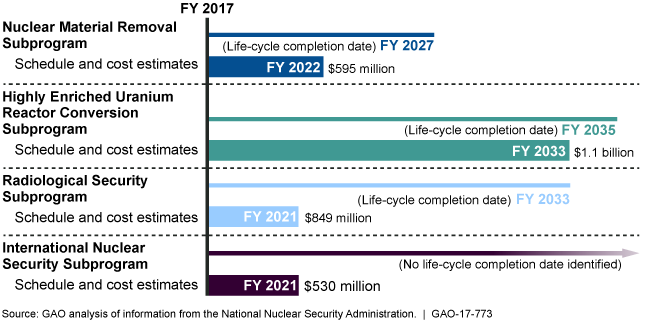Nuclear Nonproliferation: NNSA Needs to Improve Its Program Management Policy and Practices
Fast Facts
What is the U.S. government doing to keep nuclear weapons out of the wrong hands?
The National Nuclear Security Administration implements nonproliferation programs to reduce the threat of more nations or non-state actors acquiring nuclear weapons or radiological materials for a “dirty bomb.” The agency requested about $1.5 billion for 2018 to fund these programs, but we found that they do not have complete schedule and cost information, limiting the ability to assess performance toward achieving their goals.
We are making a recommendation to bring the agency's nonproliferation program management in line with leading practices.
None of the Four Programs We Selected Has a Schedule and Cost Estimate Through Its Planned Completion Date

Graphic showing extent of programs' schedule and cost estimates compared to planned completion dates.
Highlights
What GAO Found
The 4 selected subprograms from the National Nuclear Security Administration's (NNSA) Office of Defense Nuclear Nonproliferation (DNN) GAO reviewed generally do not use selected program management leading practices to manage schedule and cost. According to generally recognized leading practices from the Project Management Institute (PMI) and GAO, programs should (1) establish schedules necessary to achieve the program's goal, (2) establish life-cycle cost estimates, and (3) measure performance against schedule and cost baselines. However, none of the DNN subprograms have schedule and cost estimates covering their planned life cycles and none measure performance against schedule and cost baselines. The following figure illustrates the extent to which the selected subprograms have established schedule and cost estimates compared to their planned life cycles.
Extent of Selected Defense Nuclear Nonproliferation Subprograms' Schedule and Cost Estimates Compared to Their Planned Life Cycles

NNSA officials said that the subprograms do not have schedules and cost estimates that cover their life cycles and do not measure performance against baselines, in part, because DNN management does not require such estimates or baseline measurements.
The lack of a requirement is consistent with the limitations in DNN's revised program management policy, which does not address leading practices on establishing schedule estimates, estimating life-cycle costs, and measuring against such baselines. According to leading practices, in developing schedule and cost estimates a program should define assumptions tailored to the program such as its life-cycle phases. Updating the DNN policy to include requirements and guidance on cost estimating and tracking performance against schedule and cost baselines could help ensure that NNSA managers and Congress have better information on how much DNN programs and subprograms may cost, the time they may need to achieve their goals, and how effectively they are being executed compared to plans.
Why GAO Did This Study
The threat posed by the proliferation of nuclear and radiological weapons remains a pressing national security challenge. DNN implements nuclear nonproliferation programs worldwide. To carry out its mission, for fiscal year 2018 DNN requested an appropriation of about $1.5 billion for its 4 major programs and their 13 subprograms.
A House Armed Services Committee report, accompanying a bill for the National Defense Authorization Act for Fiscal Year 2017, included a provision for GAO to review and assess DNN's project and program management processes and systems. GAO's report examines the extent to which (1) selected DNN subprograms use program management leading practices to manage schedule and cost (2) DNN has incorporated leading practices in its revised program management policy.
GAO selected 4 DNN subprograms to review that had defined end dates and/or work scope and that GAO had not recently examined. GAO reviewed documentation on DNN and NNSA's program management policies and practices; reviewed selected leading practices published by PMI and GAO; and interviewed agency officials.
Recommendations
GAO recommends that DNN revise its program management policy to require DNN programs and subprograms to follow life-cycle program management, such as requiring life-cycle estimates and measuring against baselines. NNSA neither agreed nor disagreed with the recommendation but plans to take action to revise its policy.
Recommendations for Executive Action
| Agency Affected | Recommendation | Status |
|---|---|---|
| Office of Defense Nuclear Nonproliferation | The NNSA Deputy Administrator for DNN should revise the DNN program management policy to require DNN programs and subprograms to follow life-cycle program management. These requirements should include development of schedule and cost estimates that cover the life cycle of DNN programs and subprograms, use of methods to account for uncertainty and risk in such estimates, use of cost and schedule baselines to measure performance over program and subprogram life cycles, and development of program management plans. (Recommendation 1) |
In March 2018, NNSA completed revisions to its Office of Defense Nuclear Nonproliferation (DNN) program management policy made in response to our recommendation. The DNN revisions documented life-cycle program management requirements for DNN subprograms. For example, among other things, the revised policy states that DNN program documentation must (1) contain life-cycle cost and schedule estimates and baselines for subprograms when appropriate; (2) define methodologies and assumptions used to account for uncertainties in life-cycle estimates for subprograms or document cases when the uncertainties make estimates so broad as to provide no appreciable benefit from expending resources on such calculations; and (3) ensure cost and schedule performance assessment against baselines is accomplished to Project Management Institute and GAO recommended standards. The revision also requires that programs have a program management plan. We reviewed DNN's revised policy document and believe DNN's action is sufficient to close the recommendation as implemented.
|
